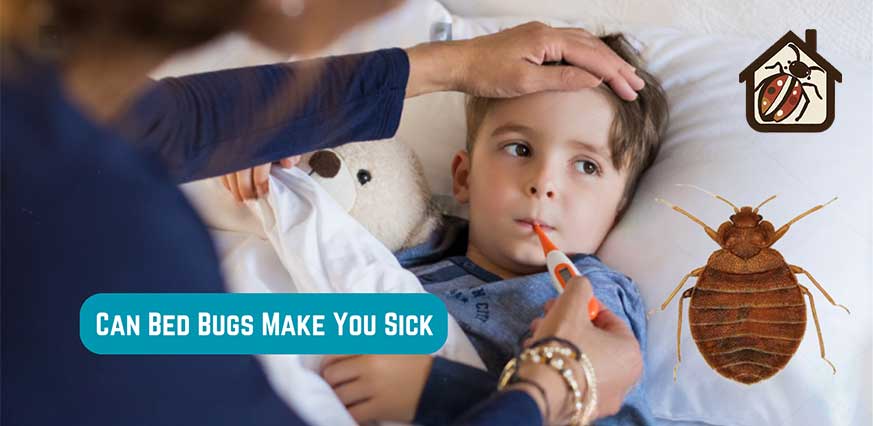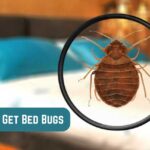
Can Bed Bugs Make You Sick
You might be thinking can Bed Bugs Make You Sick, they don’t bring major diseases, but these persistent pests can be a real bother, causing discomfort and stress. From hotels to homes, they’re everywhere, making us wonder: Can Bed Bugs Make You Sick? Stick around as we dig into the world of Canadian bed bugs, revealing how common they are, the issues they create, and whether they pose any health risks.
Overview of different types of Bed Bugs
Common Bed Bug (Cimex lectularius)
| Appearance | Habitat | Feeding Habits |
|
|
|
Tropical Bed Bug (Cimex hemipterus)
| Appearance | Habitat | Feeding Habits |
|
|
|
Bat Bug (Cimex pilosellus):
| Appearance | Habitat | Feeding Habits |
|
|
|
Swallow Bug (Oeciacus hirundinis)
| Appearance | Habitat | Feeding Habits |
|
|
|
Western Conifer Seed Bug (Leptoglossus occidentalis):
| Appearance | Habitat | Feeding Habits |
|
|
|
Kissing Bug (Triatoma species)
| Appearance | Habitat | Feeding Habits |
|
|
|
Common signs of a bed bug infestation.
| Sign | Description |
| Bite Marks | Clusters of itchy, red welts, often in a straight line or zigzag pattern, appear on exposed skin after sleep. |
| Blood Stains | Small, rusty, or reddish stains on sheets, mattresses, pillowcases, and furniture where bed bugs have been crushed. |
| Fecal Stains | Dark brown or black spots, about the size of a period, are found on mattresses, bedding, and near-bed frames. |
| Eggs and Eggshells | Tiny, pale yellow eggs (about 1mm) and shed nymphal skins are found in clusters on mattresses, seams, and crevices. |
| Live Bed Bugs | Flat, oval-shaped insects about the size of an apple seed, reddish-brown in color, visible to the naked eye. |
| Musty Odor | A sweet, musty smell, similar to almonds or coriander, emitted by bed bugs and their droppings. |
| Cast Skins | Translucent, yellowish-brown husks shed by nymphs as they grow. |
Health Concerns and Bed Bugs
Bed bugs, those annoying nighttime visitors, have been a bother for ages. In the past, people thought they were connected to diseases like typhus and the bubonic plague because they hung out in places with diseases so bed bugs make you sick. But now, recent research shows that bed bugs don’t spread major diseases.
What are the misconceptions about bed bugs?
- Hygiene-relate: Some believe bed bugs only hang out in dirty places. But here’s the truth: they can show up in any home, whether it’s super clean or not.
- Location-based: People might think bed bugs stick to big cities. Nope, they’re equal opportunity pests – you can find them in urban and rural areas alike.
- Activity period: Ever heard that bed bugs only come out to play at night? Well, that’s not entirely true. If they’re hungry, they might decide to snack on you during the day.
- Transmission source: While many blame used furniture as the bed bug culprit, the reality is they’re quite the hitchhikers. They can hop on your luggage, clothes, or anything else and make themselves at home.
- Cold-sensitive: Some think bed bugs can’t handle Canada’s chilly winters. Surprise, surprise – they can endure the cold and keep on reproducing. So, winter won’t save you from these little pests.
Allergic Reactions and Secondary Infections
| Category | Description | Symptoms | Treatment |
| Allergic Reactions | Allergic reactions to bed bug bites can be mild or severe, varying depending on individual sensitivity. |
|
|
| Secondary Infections | Scratching itchy bites can break the skin, creating entry points for bacteria, and leading to secondary infections. |
|
|
How does bed bug infestation affect mental health?
Bed bug infestation affects mental health in the following ways:
- Anxiety and Stress: Constant worry about bed bugs, both at home and in public spaces, can lead to chronic anxiety and stress. Individuals may become hypervigilant, constantly checking for signs of the bugs and fearing bed bug bites.
- Sleep Disorders: The fear of being bitten at night can disrupt sleep patterns, leading to insomnia, fatigue, and irritability. This can further exacerbate anxiety and depression.
- Depression and Shame: Feelings of shame, embarrassment, and isolation are common in individuals experiencing bed bug infestations. They may feel ostracized by friends and family and avoid social interactions due to fear of spreading the bugs.
- Post-Traumatic Stress Disorder (PTSD): In some cases, the emotional trauma of living with bed bugs can lead to PTSD, characterized by flashbacks, nightmares, and hypervigilance. This can significantly impact daily life and require professional therapy.
How to keep bed bugs away
The preventive measures to keep bed bugs away are as follows:
- Stay alert: Keep an eye out for bed bugs in your home. Look for live bugs, their shed skin, bloodstains, or fecal matter.
- Seal up gaps: Bed bugs like hiding in tiny spaces, so close off cracks in your walls, baseboards, and around outlets.
- Guard your bed: Use special covers on your mattress and box spring to keep bed bugs out.
- Laundry routine: Wash your bedding, like sheets and pillowcases, every week in hot water (at least 50°C). Dry them on high heat.
- Vacuum often: Give your carpets, floors, and furniture a regular vacuum, especially focusing on corners and seams.
- Clear the clutter: Bed bugs love hiding in mess, so tidy up your home and get rid of unnecessary stuff.
- Used furniture caution: Check second-hand furniture for bed bugs before bringing it home. You might want to treat it with heat before using it.
- Travel smart: Before unpacking at a hotel, inspect for bed bugs. Keep your luggage on racks or in a closed closet. Wash your clothes in hot water once you’re back home.
Control Measures to keep bed bugs in check
- Get professional help: If you think you have bed bugs, reach out to a pest control expert right away. They know how to get rid of bed bugs using the right methods and tools.
- Follow their instructions: Listen carefully to what the pest control team tells you. Do what they say, including getting your home ready for treatment and doing anything they suggest after.
- Clean and heat things: Wash all your bedding, clothes, and anything with bed bugs in hot water (at least 50°C). Dry them on high heat. If you can’t wash something, seal it in a bag and leave it in the sun for a few days.
- Vacuum a lot: Keep your place super clean by vacuuming often. This helps you to get rid of bed bugs that are leftovers or their eggs.
- Keep an eye out: Even after treatment, keep checking your home for bed bugs. If you see any signs they’re back, call the pest control folks right away.
You may also like:
FAQs
1. Can bed bugs directly transmit diseases?
2. Can bed bug bites cause any health problems?
3. Can bed bugs cause mental health problems?
4. What can I do to reduce the itchiness from bed bug bites?
5. When should I seek medical attention for bed bug bites?
6. What are some tips for preventing bed bug infestations in Canada?
Conclusion
While bed bugs don’t necessarily give you diseases in Canada, they can still affect your health. Their bites can make you itchy and uncomfortable, and scratching might lead to infections. The stress from dealing with them can also cause anxiety, sleep problems, and even depression. So, even though they don’t make you sick directly, it’s important to get rid of them quickly to keep yourself well.


